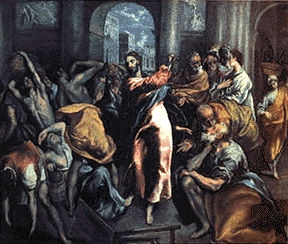
AnthonyFlood.com
Philosophy against Misosophy

Jesus Is an Anarchist
James Redford
16. Jesus on the Rich
Jesus had this to say about the rich:
Luke 18:18-30: Now a certain ruler asked Him, saying, "Good Teacher, what shall I do to inherit eternal life?" So Jesus said to him, "Why do you call Me good? No one is good but One, that is, God. You know the commandments: "Do not commit adultery,' "Do not murder,' "Do not steal,' "Do not bear false witness,' "Honor your father and your mother."' And he said, "All these things I have kept from my youth." So when Jesus heard these things, He said to him, "You still lack one thing. Sell all that you have and distribute to the poor, and you will have treasure in heaven; and come, follow Me." But when he heard this, he became very sorrowful, for he was very rich.
And when Jesus saw that he became very sorrowful, He said, "How hard it is for those who have riches to enter the kingdom of God! For it is easier for a camel to go through the eye of a needle than for a rich man to enter the kingdom of God." And those who heard it said, "Who then can be saved?" But He said, "The things which are impossible with men are possible with God." Then Peter said, "See, we have left all and followed You." So He said to them, "Assuredly, I say to you, there is no one who has left house or parents or brothers or wife or children, for the sake of the kingdom of God, who shall not receive many times more in this present time, and in the age to come eternal life." (See also Matt. 19:16-30; Mark 10:17-31.)
Some have given this as anti-libertarian commentary. But first of all, in analyzing this statement by Jesus it needs to be pointed out that it is easier for a camel to go through the eye of a needle than for any person whatsoever to enter the Kingdom of God.
But Jesus also said that "The things which are impossible with men are possible with God" (verse 27). It is standard Christian doctrine that it is impossible for anyone to enter the Kingdom of God on their own – that the only way in which anyone enters the Kingdom of God is through the saving grace of Jesus Christ alone (see John 14:6).
Thus, the rich are by no means unique in this particular aspect. And so also, from this alone it cannot be claimed that Jesus had it in for rich people per se more than any other group.
Second, when Jesus counseled this particular rich person to sell all that he had and distribute the proceeds to the poor, this was in fact an exceedingly libertarian thing for Jesus to advise this person.
For this was not just any kind of rich person – this was a rich person of a particular type: a ruler, i.e., one who has some variety of command over an Earthly, mortal government.
And thus, the riches that this particular rich person was in possession of had been obtained through extortion and theft, i.e., by the threat and force of arms and might – this particular ruler's opinion to the contrary (verse 21) not withstanding scrutiny: almost no rulers throughout history have ever regarded their wealth as having been obtained through stealing:
Justice being taken away, then, what are kingdoms but great robberies? For what are robberies themselves, but little kingdoms? The band itself is made up of men; it is ruled by the authority of a prince, it is knit together by the pact of the confederacy; the booty is divided by the law agreed on. If, by the admittance of abandoned men, this evil increases to such a degree that it holds places, fixes abodes, takes possession of cities, and subdues peoples, it assumes the more plainly the name of a kingdom, because the reality is now manifestly conferred on it, not by the removal of covetousness, but by the addition of impunity. Indeed, that was an apt and true reply which was given to Alexander the Great by a pirate who had been seized. For when that king had asked the man what he meant by keeping hostile possession of the sea, he answered with bold pride, "What thou meanest by seizing the whole earth; but because I do it with a petty ship, I am called a robber, whilst thou who dost it with a great fleet art styled emperor." (St. Augustine, Book 4, Chapter 4 of The City of God.)
Thus, when Jesus offered this counsel to this particular rich person, He was merely telling this person what any good libertarian would have said in the same situation – particularly a natural-rights libertarian such as a Rothbardian.
Next
17. Jesus Engaged in Conspicuous Consumption When He Could Have Provided for the Poor Instead